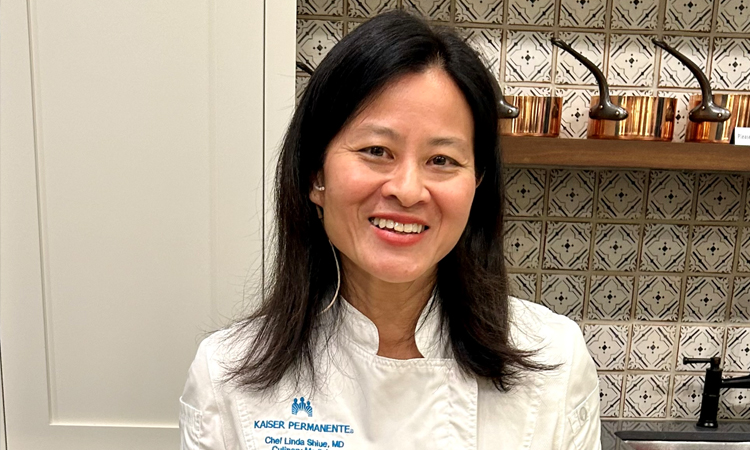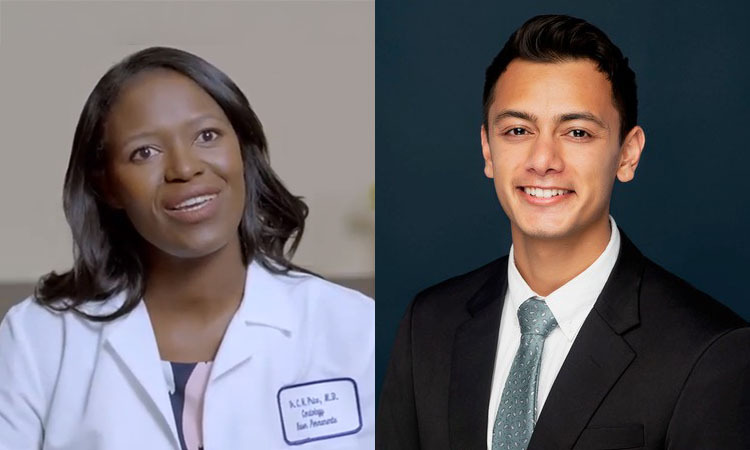Despite evidence linking obesity, diabetes, cancer, and other health conditions to Americans’ diet and eating habits, most doctors have received little or no formal training on how to advise patients about nutrition and food choices. A new study by a diverse panel of medical educators and nutrition experts, and coauthored by Linda Shiue, MD, Kaiser Permanente Bernard J. Tyson School of Medicine (KPSOM) Clinical Associate Professor of Clinical Science, recommends that a broad set of nutritional competencies be adopted in US medical education to help prepare physicians to meet this challenge. The study was recently published in JAMA Open Network.
“Nutrition and dietetics is housed in a completely separate school from medical school,” said Shiue. “It's never combined; it was considered a separate allied health field, not part of medical school. The common refrain is, ‘There's so much to cover already in medical school,’ and [nutrition] has been thought of as something extra.” Recent studies show that poor diet, “[I]s the number one cause of death, period, in this country,” Shiue added. “And so, [nutrition] is really the most important thing.” Still, nutrition competencies have not been previously mandated in medical education, which remains a significant gap, Shiue said.
The new study was launched by researchers at Harvard T.H. Chan School of Public Health, Tufts University, and Sprink, a United Kingdom-based consultancy, who recruited an expert panel of 37 medical educators, nutrition scientists, physicians, residency directors, and registered dietician nutritionists from across the country. The panelists were surveyed about a list of 354 nutrition competencies, ranking them and providing feedback. The panel recommended 36 nutrition competencies for undergraduate and graduate medical school and training. The competencies spanned six categories related to nutrition in the practice of medicine: foundational nutritional knowledge, assessment and diagnosis, communication skills, public health, collaborative support and treatment for specific conditions, and indications for referral.
The study was created in response to a 2022 bipartisan resolution passed by the U.S. House of Representatives, which called for “meaningful physician and health professional education on nutrition and diet.” The resolution cited concerns about the increasing prevalence of diet-related diseases and Medicare costs, which totaled $800 billion in 2019. Congressional financial support for medical residents in U.S. hospitals was estimated at $16.2 billion in 2020.
Dr. Shiue, a longtime advocate of the "food as medicine" movement, created KPSOM’s Culinary Medicine selective course along with a KPSOM team including course co-Director Nancy Spiegel, Ivana Lin, Nathalie Hart, Mischka Makuch, Robert Fernandez, and Dr. Elizabeth Duenas from Southern California Permanente Medical Group, in an effort to fill this gap in traditional medical education, teaching future doctors about the vital connection between nutrition and health and emphasizing the importance of working with multidisciplinary teams to address chronic illnesses related to diet.
In the following interview, Dr. Shiue discusses her work on the study and its findings. The interview has been lightly edited for clarity and length.
What is the significance of this study and the background behind it?
For those of us who are involved in this work, it's a huge deal and a sea change in nutrition education within medical education. This paper basically is making a proposal of competencies that we hope will be required of all future medical trainees. That is something which would be completely new, and that's why it's so significant. The study was done in response to [a Congressional resolution] that we need to have nutrition in medical education.
Despite the fact that the federal government funds residencies, nutrition was not a required part of medical education, it was only suggested. The hope is, now that there is legislation, that this paper now stands there as the blueprint for however any given institution wants to shape this.
That was a goal—to make it something that can be tailored to the local needs and desires of each school. We [are saying], okay, now that you might be required to teach nutrition competencies as tied into your government funding for your residency program, we already have suggestions for you, and you can choose from this menu. So, it's huge in that way.
Why has medical education lagged in the area of nutrition?
I think simply because Western medicine and academic institutions have not actually recognized the importance of nutrition, even though it's the foundation of all the earliest medical systems, dating back to the ancient Greeks and Romans. Hippocrates supposedly had said, “Let food be thy medicine, and let medicine be thy food.” Even before that, in traditional Chinese medicine, in Ayurveda in India, or in Okinawa, food is actually the basis of all of those medical systems and the imbalance or eating the wrong foods is what is thought to be the cause of disease. And then somehow, we started in Western medicine, saying, “This is what medicine is, this is what science is.” I think that food was thought to be the old way, and not scientific.
There are many other factors that contribute to our health and disease; we definitely want to utilize advances in pharmaceuticals and in medical treatments and procedures. But if you don't actually start with food, you will never actually completely heal a patient or make someone feel well. We need to include it, and that is what has been missing from what we learn in medical school. We learn a lot about pharmacology, we learn a lot about physiology. We learn about biology, all those things we need to know, but if we ignore food or make it something that is handed off to someone else, such as the health educators or the dietitians, then doctors can't actually be the best doctors that they can be.
Some of the most heavily marketed foods in our society, such as fast food, soft drinks, and snacks are the foods often cited in connection with obesity and diabetes and other conditions. How can medical education confront this challenge?
This is why this is so important. If we can [incorporate nutrition competencies in medical education], then we will actually have doctors giving the right information to their patients, correcting the misinformation. Even if it's a very simple thing, like cutting out soda and sugar sweetened beverages, that one action alone can sometimes completely transform someone's life, or their weight. You know, if someone's drinking a lot of soda and they cut that out, they can lose something like 30 pounds or more without doing anything else. And it's not actually about the weight itself, it's the associated conditions—diabetes, cardiovascular disease, cancer also. That's why diet is a number one cause of death, because it's related to all those things.
That is the importance here: We can train doctors so that when a patient asks them and knows that they can trust them about nutrition information—that can change the course of everyone's health.
You teach an elective course at KPSOM that fills the very gap in traditional medical education that this study aims to address, teaching future doctors about the vital connection between nutrition and health to address illnesses related to diet. Is that how you were identified as a potential coauthor?
Yes, from both my work at KPSOM, my clinical work at The Permanente Medical Group, and my educational work presenting at national conferences on culinary and lifestyle medicine They chose people from various fields. Some of them are doctors like me who practice and teach culinary medicine, and then there are some dietitians who teach this work in various places. Importantly, they also invited residency directors from a variety of fields, who are not involved in nutrition at all, as a way of really understanding what would resonate with them. Because they're the ones who are going to implement it.
What do you see as the potential impact on medical education curriculum in general, and at our school?
The legislation actually is tied to graduate medical education. So, at this initial stage, the legislation isn't going to be making any medical school do this; it's going to be at the graduate [hospital-based training] level. However, the hope is that it will filter down; it’s going to happen in stages. In 1985, the National Academy of Sciences recommended at least 25 hours of nutrition education in medical school, but a survey of U.S. medical schools in 2010 found that only 27 percent of programs met that recommendation.
[In the study], there are six categories that the 36 nutrition competencies fall into. And I was very happy to see that the Culinary Medicine elective that we created at KPSOM addresses [five] of them: Foundational nutrition knowledge, communication skills, public health, collaborative treatment, and indications for referral—we very specifically included these things in our curriculum. Most of the other three dozen or so culinary medicine electives at medical schools around the country do not actually address those things. Most may address nutritional knowledge to some degree, and communication skills to some degree, but not working on an interdisciplinary team—which is what is covered by “collaborative support” and “indications for referral.”
I think the reason why ... we are able to [teach these things in our Culinary Medicine course] is because we’re part of Kaiser Permanente and its integrated medical system. I really see that as a strength and something that is unique about our medical system, and I really wanted the medical students—wherever they're going to go after they graduate—to understand the strength of that and know how to navigate it, because that is something which medical students are not traditionally taught at any level, and I think can really affect the quality of care that you provide, both as a trainee and as a future doctor. Do you know how to work with your non-physician colleagues in a way that optimizes medical care for your patient? That’s probably the biggest learnings in medicine, and I already see this built into the culinary medicine elective that we started this year.
Do you envision a time when nutritional competencies will be required in undergraduate medical education?
I want it to be a requirement for all students, actually. When [KPSOM] opened during the pandemic, for the first two years, it was required. I did a two-hour workshop as part of REACH. The first-year students all got a little bit of exposure to nutrition as taught through culinary medicine.
One thing I appreciated about our six students, who took the [Culinary Medicine] elective when we offered it for the first time, was that they spanned many different specialties that they were going into for residency, not just primary care. They recognized the importance of nutrition for the care of their patients, whether they're going into primary care, surgery, anesthesiology, or oncology. And I agree with them that this is something that every single doctor needs to know about. They may or may not use this directly when they become practicing physicians, but we really do need to have them know more about nutrition … I do think that they all need to have some basic nutrition coursework mandated.
Read the JAMA article here .
Read the official press release here .



